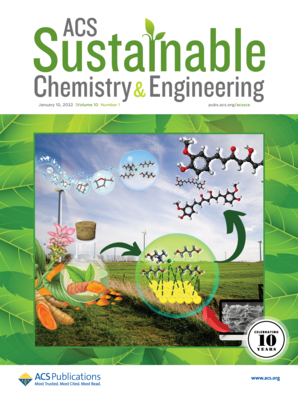Review and Perspectives on the Sustainability of Organic Aerogels
IF 7.1
1区 化学
Q1 CHEMISTRY, MULTIDISCIPLINARY
引用次数: 0
Abstract
Aerogels are exceptionally lightweight materials characterized by their high open porosity and remarkable specific surface area, currently used across a wide array of industrial sectors from construction to energy storage and have great potential for expanding their applicability and unlocking new market opportunities. Driven by global economic growth and an intensifying environmental crisis, there is a growing demand for engineering innovations that prioritize sustainability. Aerogels are well-positioned to support these sustainability efforts. Their unique properties make them ideal for energy-saving solutions, environmental remediation, and more efficient use of resources. As the demand for eco-conscious technologies rises, aerogels are poised to contribute significantly to the development of greener, more efficient products and processes across multiple industries. The sustainability of aerogel technology is crucial for the mid-to-long-term future, yet its current status has been scarcely reviewed in the literature. This Perspective explores and critically reviews significant advances on organic and hybrid aerogels in the current socioeconomic scenario, with selected case studies endorsing their contribution to the UN Sustainable Development Goals. It also identifies research gaps while proposing innovative strategies to enhance the sustainability of aerogel production through the application of circular economy principles. Key strategies discussed involve the fabrication of aerogels using eco-friendly sources, such as biopolymers derived from biorefinery processes or from waste materials. Additionally, this Perspective examines the development of methods for the reuse, recycling, and end-of-life management of aerogels, along with the implementation of more efficient processing routes. Ultimately, this work highlights the need for comprehensive assessments of aerogel sustainability through life cycle assessment (LCA) and evaluations of safety and toxicity. By addressing these critical aspects, the potential of aerogels to contribute to a more sustainable future appears highly favorable from both commercial and research perspectives, paving the way for a circular aerogel economy and providing a lasting impact to the society in which we live.

有机气凝胶可持续性研究进展与展望
气凝胶是一种非常轻的材料,其特点是其高孔隙率和显著的比表面积,目前广泛应用于从建筑到储能的一系列工业领域,具有扩大其适用性和释放新的市场机会的巨大潜力。在全球经济增长和日益加剧的环境危机的推动下,对优先考虑可持续性的工程创新的需求日益增长。气凝胶能够很好地支持这些可持续发展的努力。它们独特的特性使它们成为节能解决方案、环境修复和更有效地利用资源的理想选择。随着对环保技术需求的增加,气凝胶将在多个行业中为更环保、更高效的产品和工艺的发展做出重大贡献。气凝胶技术的可持续性对中长期的未来至关重要,但其目前的状况在文献中几乎没有得到回顾。本展望探讨并批判性地回顾了有机气凝胶和混合气凝胶在当前社会经济形势下的重大进展,并选择了一些案例研究来支持它们对联合国可持续发展目标的贡献。它还确定了研究差距,同时提出了创新战略,通过应用循环经济原则来提高气凝胶生产的可持续性。讨论的关键策略包括使用环保资源制造气凝胶,例如来自生物精炼过程或废物的生物聚合物。此外,本展望还探讨了气凝胶的再利用、回收和报废管理方法的发展,以及更有效的处理路线的实施。最后,这项工作强调了通过生命周期评估(LCA)和安全性和毒性评估来全面评估气凝胶可持续性的必要性。通过解决这些关键问题,从商业和研究的角度来看,气凝胶为更可持续的未来做出贡献的潜力是非常有利的,为循环气凝胶经济铺平了道路,并为我们所生活的社会提供了持久的影响。
本文章由计算机程序翻译,如有差异,请以英文原文为准。
求助全文
约1分钟内获得全文
求助全文
来源期刊

ACS Sustainable Chemistry & Engineering
CHEMISTRY, MULTIDISCIPLINARY-ENGINEERING, CHEMICAL
CiteScore
13.80
自引率
4.80%
发文量
1470
审稿时长
1.7 months
期刊介绍:
ACS Sustainable Chemistry & Engineering is a prestigious weekly peer-reviewed scientific journal published by the American Chemical Society. Dedicated to advancing the principles of green chemistry and green engineering, it covers a wide array of research topics including green chemistry, green engineering, biomass, alternative energy, and life cycle assessment.
The journal welcomes submissions in various formats, including Letters, Articles, Features, and Perspectives (Reviews), that address the challenges of sustainability in the chemical enterprise and contribute to the advancement of sustainable practices. Join us in shaping the future of sustainable chemistry and engineering.
 求助内容:
求助内容: 应助结果提醒方式:
应助结果提醒方式:


